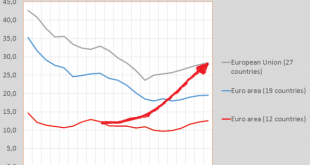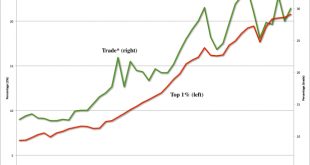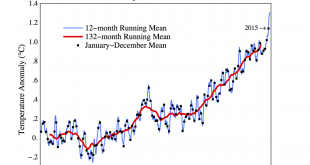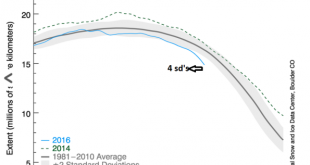from Asad Zaman The first post on Reading Keynes provided an outline of the reasons why this is a good idea. It is clear that economics is broken. We need a new macroeconomics for the 21st century, one which can solve the massive problems which humanity as a whole is facing on political, social, economic, and environmental dimensions. Keynes faced similar problems, and found solutions which guided economic policy in the mid twentieth century. It is always useful to absorb the insights of...
Read More »Sitglitz comes around
A new paper by Joseph Stiglitz (it might be that he has been holding these ‘heterodox’ (better: common sense) views for some time already): In the aftermath of the Great Recession, there is a growing consensus, even among central bank officials, concerning the limitations of monetary policy. This paper provides an explanation for the ineffectiveness of monetary policy, and in doing so provides a new framework for thinking about monetary policy and macro-economic activity. What matters is...
Read More »P1: Reading Keynes
from Asad Zaman I am planning a sequence of posts on re-reading Keynes, where I will try to go through the General Theory. This first post explains my motivations for re-reading Keynes. As always, my primary motive is self-education; this will force me to go through the book again — I first read it in my first year graduate course on Macroeconomics at Stanford in 1975, when our teacher Duncan Foley was having doubts about modern macro theories, and decided to go back to the original...
Read More »Macro and migration – EU edition.
So, ‘What’s it going to be then, eh’? Will we let migration wreck the EU or will we opt for sound macro policies? The non-far right should double down on the present freedom of movement of people inside the EU. But only when credible macro-economic demand and welfare policies are installed. Otherwise, the internal inconsistencies of the present macro-economic set up will fracture the EU. Which means that the freedom of capital flows, one of the other EU freedoms, might have to be...
Read More »Mainstream economists, globalization, and Trump
from David Ruccio Are mainstream economists responsible for electing Donald Trump? I think they deserve at least part of the blame. So, as it turns out, does Dani Rodrick. My argument is that, when mainstream economists in the United States embraced and celebrated neoliberalism—both the conservative and “left” versions—they created the conditions for Trump’s victory in the U.S. presidential election. As I see it, mainstream economists adopted neoliberalism as a set of ideas (about...
Read More »Blame globalization?
David Ruccio Chris Dillow is right about one thing: citing globalization as the reason for the success of Donald Trump’s campaign, especially among working-class voters, “suits some people very well for foreigners to get the blame rather than for inequality and the health of capitalism to come under scrutiny.” But that doesn’t mean that, alongside many other factors (from the decline in labor unions to increasing automation), globalization—to be precise, capitalist globalization—doesn’t...
Read More »Above the rising trend. Update on global temperature
From: Geoff Davies (reblogged from: Our better nature) (a comparable graph not including 2016 has been published a few days ago, developments in 2016 are however so extreme and out of sample that this data has to be included, too, M.K.) A couple of graphs show the extraordinary nature of the present situation. 1998 used to be one of the biggest outliers from the general trend. 2016 is going way beyond that. The second graph shows the deviation from the recent trend more clearly: It...
Read More »Food and Justice
The WEA online conferenceFood and JusticeIdeas for a new global food agenda is now openThe DISCUSSION FORUM is open access.
Read More »Surviving the Age of Trump
from Dean Baker I will claim no special insight into the politics that led to Trump’s election last Tuesday. I was as surprised as anyone else when not just Florida and North Carolina, but also Pennsylvania, Michigan, and Wisconsin started to turn red. But that’s history now. We have to live with the fact of President Trump and we have to figure out how to protect as much as possible of what we value in this country from his presidency. This won’t be easy when the Republicans control both...
Read More »Two little black swans
Most tables of the normal distribution stop at 3 standard distributions or, to state this differently, at the point were (assuming a stable world) the chance that an individual estimate of a variable is farther removed from the average of all estimated variables is 1:1000. Let’s call this the black swan point. Estimates further removed from the average are ‘black swans’. Such estimates might indicate that we’ve moved to a new situation with a new average. Ahem: arctic and antarctic sea...
Read More » Real-World Economics Review
Real-World Economics Review





